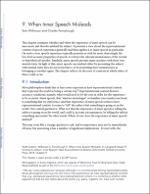Chapter 9 When Inner Speech Misleads
| dc.contributor.author | Wilkinson, Sam | |
| dc.contributor.author | Fernyhough, Charles | |
| dc.date.accessioned | 2021-05-17T08:58:24Z | |
| dc.date.available | 2021-05-17T08:58:24Z | |
| dc.date.issued | 2018 | |
| dc.identifier.uri | https://library.oapen.org/handle/20.500.12657/48631 | |
| dc.description.abstract | This chapter examines whether and when the experience of inner speech can be inaccurate and thereby mislead the subject. It presents a view about the representational content of speech experience generally and then applies it to inner speech in particular. On such a view, speech experience typically presents us with far more than simply the low-level acoustic properties of speech: it conveys the relevant mental states of the (actual or hypothetical) speaker. Similarly, inner speech presents inner speakers with their own mental states. In light of this, inner speech can mislead either by presenting the subject with mental states they do not in fact have, or by presenting these mental states as belonging to another agent. The chapter reflects on the sorts of contexts in which either of these could occur. | en_US |
| dc.language | English | en_US |
| dc.subject.classification | bic Book Industry Communication::C Language::CF linguistics::CFA Philosophy of language | en_US |
| dc.subject.classification | thema EDItEUR::C Language and Linguistics::CF Linguistics::CFA Philosophy of language | en_US |
| dc.subject.other | inner speech; language; mental state; philosophy | en_US |
| dc.title | Chapter 9 When Inner Speech Misleads | en_US |
| dc.type | chapter | |
| oapen.relation.isPublishedBy | b9501915-cdee-4f2a-8030-9c0b187854b2 | en_US |
| oapen.relation.isPartOfBook | 35de7ad1-bcd5-424e-b1ff-43f74d041e45 | en_US |
| oapen.relation.isFundedBy | d859fbd3-d884-4090-a0ec-baf821c9abfd | en_US |
| oapen.collection | Wellcome | en_US |
| oapen.pages | 17 | en_US |
| oapen.place.publication | Oxford | en_US |

